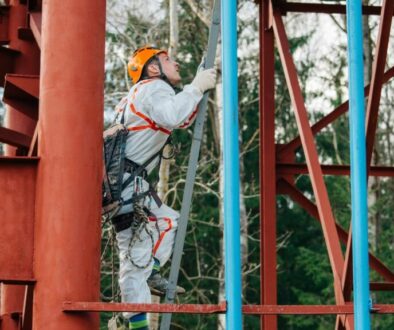How To Become A Scaffolder?
If you are interested in becoming a scaffolder, you will need to be physically fit, have excellent hand-eye coordination, and be comfortable working at heights. Becoming a scaffolder requires specific skills and knowledge, but with the right guidance, you can build a successful career in this field. In this article, we will go through the steps you need to take to become a successful scaffolder.
Steps To Becoming A Scaffolder
Becoming a scaffolder is a great career choice for those who enjoy working outdoors and have a passion for construction. Scaffolding is an essential part of any construction project, and skilled scaffolders are always in demand.
- Qualifications and Training
The first step to becoming a scaffolder is to obtain the necessary qualifications and training. This usually involves attending a scaffolding course at a construction college or training center. During this training, you will learn about the various types of scaffolding systems, the safety measures required when using scaffolds, and how to erect and dismantle scaffolds properly.
It is important to note that scaffolding can be a dangerous job, and safety is of utmost importance. Therefore, the training you receive will focus heavily on safety measures, including how to properly secure scaffolds and how to use personal protective equipment. - Experience on a Construction Site
Once you complete the training, you will need to gain practical experience on a construction site. This will help you to develop your skills and knowledge while learning from experienced scaffolders. There are usually apprenticeship opportunities available with construction companies, and these can be an excellent way to gain the necessary experience and knowledge.
During your apprenticeship, you will learn about the different types of scaffolding systems and how to select the appropriate system for a particular job. You will also learn about the different types of materials used in scaffolding, such as steel and aluminum, and how to properly assemble and disassemble scaffolding structures.
Additionally, you will learn about the importance of teamwork in scaffolding. Scaffolding requires a team effort, and each member of the team must work together to ensure that the job is completed safely and efficiently. - Scaffolding Certification
Once you have gained sufficient experience, you can then apply for a Scaffolding certification. The scaffolding certification will enable you to work on construction sites legally and professionally. This certification demonstrates that you have the necessary knowledge and skills to work as a scaffolder and that you are committed to safety and professionalism in your work.
Becoming a scaffolder requires a combination of training, practical experience, and certification. It is a rewarding career that offers a sense of accomplishment and the opportunity to work on a variety of construction projects. With the right training and experience, you can become a skilled scaffolder and make a valuable contribution to the construction industry.
Skills Needed For Becoming A Scaffolder
Several skills are necessary to become a successful scaffolder. Firstly, you will need to have good communication skills and the ability to work well with others as scaffolding is usually a team-based activity. You will be working with other scaffolders, construction workers, and engineers, so it’s essential to be able to communicate effectively and work together to achieve a common goal.
Another crucial skill for scaffolders is problem-solving. Construction sites can be unpredictable, and unexpected issues can arise regularly. As a scaffolder, you need to be able to think on your feet and come up with solutions to problems quickly. This skill is especially important when working on complex projects that require intricate scaffolding designs.
Hand-eye coordination is also a must-have for anyone who wants to become a scaffolder. You will be working with heavy equipment and materials, so having excellent hand-eye coordination is essential to ensure that you can work safely and efficiently.
In addition to hand-eye coordination, good physical fitness is also necessary for scaffolders. You will be required to lift heavy objects and work at heights, so being in good physical condition is essential to prevent injury and ensure that you can perform your job effectively.
Comfort working at heights is another critical skill for scaffolders. You will be working at heights that can be intimidating for some people, so having the ability to work at heights without fear is essential. Scaffolding can be a challenging and demanding job, but it can also be incredibly rewarding for those who enjoy working in a high-pressure, fast-paced environment.
Attention to detail is also an essential skill for scaffolders. Every scaffold needs to be accurately assembled to ensure safety, so having an eye for detail is crucial. Scaffolding is a job that requires precision and accuracy, and even the smallest mistake can have serious consequences.
Becoming a successful scaffolder requires a combination of technical skills, physical fitness, and personal attributes such as problem-solving, communication, and attention to detail. If you have these skills and enjoy working in a challenging and rewarding environment, then a career in scaffolding may be the perfect fit for you.
What is A Scaffolder?
A scaffolder is a highly skilled tradesperson who plays a critical role in the construction industry. They are experts in building and dismantling temporary structures, known as scaffolds, which are used to support workers and equipment during construction projects. These structures are essential in many construction projects and allow workers to move around safely and efficiently while working at height.
Scaffolding structures can range from small, single-level platforms to complex systems that encircle an entire building or structure. The scaffolds are made up of various components, including tubes, couplers, boards, and other materials, which are carefully assembled to create a stable and secure platform for workers to stand on.
Building a scaffold requires a high level of skill and expertise, as the structure must be able to support the weight of workers, tools, and materials without collapsing or becoming unstable. Scaffolders must also be able to work quickly and efficiently, as time is often of the essence in construction projects.
One of the most important roles of a scaffolder is to ensure that the scaffold is safe and secure. They must carefully inspect the structure before each use to ensure that it is in good condition and free from defects. They must also ensure that the scaffold is erected in accordance with strict safety regulations and guidelines, to prevent accidents and injuries.
In addition to building and dismantling scaffolds, scaffolders may also be responsible for maintaining and repairing scaffolding structures. This can include replacing damaged components, reinforcing weak areas, and ensuring that the scaffold remains in good condition throughout the construction project.
Overall, scaffolders play a vital role in the construction industry, and their expertise and skill are essential in ensuring that construction projects are completed safely and efficiently.
The Benefits of Working as A Scaffolder
Working as a Scaffolder can be a fulfilling and rewarding career choice. Scaffolders are responsible for constructing temporary structures that support workers and materials during construction, maintenance, and repair of buildings, bridges, and other structures. The job requires physical strength, stamina, and attention to detail, but it also offers a sense of pride and accomplishment when a project is completed successfully.
One of the primary benefits of working as a scaffolder is job security. The construction industry is always in need of skilled workers, especially those who can work at heights and in challenging environments. Scaffolders are in high demand, and the job outlook for the profession is expected to grow over the next decade.
Another benefit of working as a scaffolder is decent pay. According to the Bureau of Labor Statistics, the median annual wage for scaffold builders and erectors is around $51,000 per year. However, this can vary depending on experience, location, and the complexity of the project.
Working as a scaffolder also provides the opportunity to work on exciting and challenging construction projects. Scaffolders are often involved in the construction of high-rise buildings, bridges, and other large structures. This means that they get to work with a variety of tools and equipment, and they get to see the progress of the project from start to finish.
Moreover, scaffolding work requires a high level of skill and expertise. Scaffolders must be able to read and interpret blueprints, understand load-bearing capacities, and follow safety protocols. This means that the job is mentally stimulating and requires constant learning and development.
Becoming a scaffolder requires dedication, hard work, and a willingness to learn. By following the steps outlined in this article, you can develop the skills and knowledge necessary to become a successful scaffolder. The scaffolding industry offers a world of exciting opportunities, not to mention the chance to do something that makes a significant contribution to the construction industry. With the right training, qualifications, and experience, you can build a successful career in scaffolding and enjoy a rewarding and fulfilling job.




